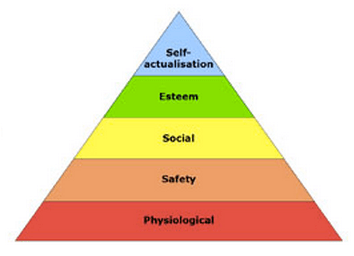One of the first things every Psychology 101 class on the planet teaches is Maslow’s Pyramid of Basic Needs.
It’s also something you find referred to often in many leadership and management texts.
The Motivation Hierarchy
Maslow’s theory organizes our human needs into a hierarchy.
Biological and physical needs are at the base–things such as food, water, air, and sleep.
Next come safety needs, feeling safe and protected, sheltered from elements, and having law and order.
After that we finally move to social needs—community, friendship, love, and affection.
And then esteem needs—achievement, status, and self respect.
All of these levels lead us to self-actualization, where we experience personal growth and realize our potential.
The best way I’ve heard Maslow’s theory described is to compare it to a video game. You have to “conquer” one level of needs before you can move on to the next.
While an organized and simple explanation of human motivation, many detractors argue it misses really important context as far as how life actually works. Needless to say, things are not often neat, tidy, and organized.
Community Drives Everything
One prevalent argument is the third tier placement of social need and belongingness in Maslow’s hierarchy. Because social connection not only drives human motivation, it also helps provide for some of our lower level needs.
Let me give you an example. During Thanksgiving I volunteered with Wayside Food Programs, a fantastic organization that provides community meals weekly across Portland.
On Thanksgiving Day, Wayside hosts a fancy and delicious dinner for those in need. I was lucky enough to be a volunteer for this event and served as a table host for an amazing group of people.
Now, accordingly to Maslow, most of these diners would be somewhere in level one or two of the needs hierarchy.
Most were without homes, or true shelter. Likewise, food and sleep are not a certainty. And security is definitely limited.
So in Maslow’s world, this group of people would still be fighting to conquer those two levels of the video game of life, and social connectedness would be the last things on their minds.
Instead, the opposite was true. In fact, it was both refreshing and inspiring to be around a group of people who so clearly cared for and supported one another (since we often see too much of the opposite in our world).
I saw a true formation of community, brought together with a bond that was even stronger because of the lower needs they were lacking.
Interconnectedness: The Foundational Need
As the interconnectedness of society increases, so does the validity of this argument.
Social media has provided a visual of this fact, and while one can argue the negative side effects it has had on our society and the way we communicate, it’s also enlarged our community and changed the way we can connect.
Author of Psychology Today’s Positively Media column Pamela Rutledge, Ph.D., M.B.A. (a great column for any communicator to read frequently), argues that these tools simply serve a needed function in our changing world, one that we’ve participated in since the beginning of society.
Our need for survival through connection plays out through every successful social technology. If we look at the last decade of social technologies, we are not seeing anything fundamentally new. People have not changed. We still have the same old tripartite brain with its reptilian drives. Facebook may not bear much resemblance to huddling around a campfire, but, in spite of moral panics to the contrary, its function is the same. (Social Networks: What Maslow Misses)
Community Building as a Basic Need
So what does this mean for all of us?
We live in a professional world where the word “community” is often seen as a tactic versus a need. And even with the best intentions that perspective lessens its power.
But when we flip it around and see community as a fundamental need—and the tools used to build and strengthen it as facilitators, it changes the intention, quality, and most importantly our relationship with it.
No doubt many of us (myself included) in our Spin Sucks community can tell stories of the ways our group of Crazies has served an important role of support in our lives, both professional and personal.
And that lesson in support should travel with us throughout all of our efforts and campaigns.
Sometimes we forget the importance of what we do. Sometimes we cheapen it, or let others do so. But when you take away the “spin,” communications is about connection.
And that’s the foundation of who we are.
